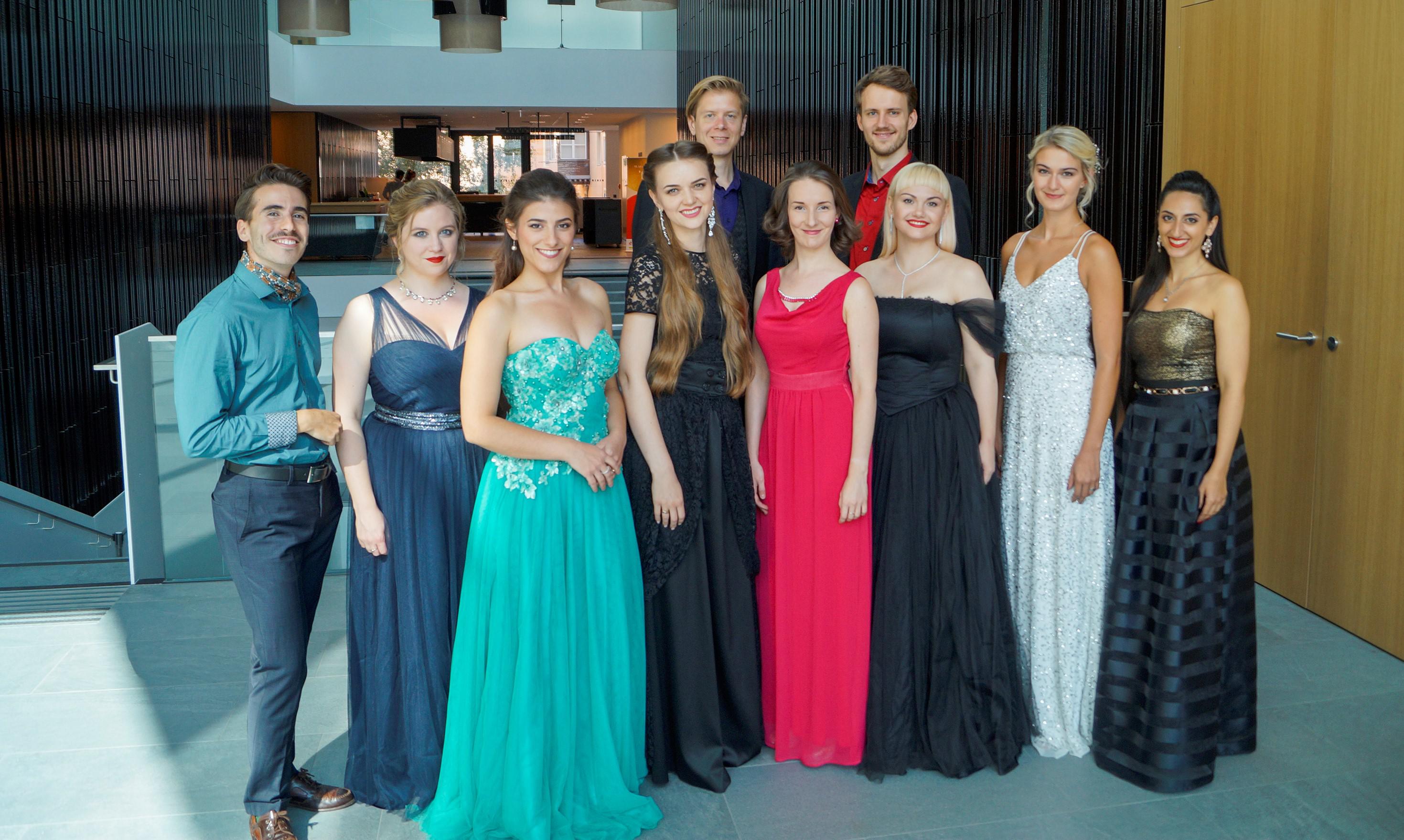Innsbruck 2019
 The ten finalists. Winner Grace Durham is second from the left. Photo © Celina Friedrichs
The ten finalists. Winner Grace Durham is second from the left. Photo © Celina Friedrichs
For the past decade an important component of the prestigious Innsbruck Early Music Festival has been the singing competition named after Pietro Antonio Cesti, several of whose operas were premiered in Innsbruck during the period he spent there as a court composer to the Archduke Ferdinand Karl. 2019 also sees the 350th anniversary of the death of Cesti, an event that will be commemorated later in the festival season with a production of his opera La Dori, first given in Innsbruck in 1657.
The singing competition was inaugurated ten years ago as the brainchild of the Innsbruck Festival’s artistic director Alessandro De Marchi, with past prize winners including a number of singers who have gone on to make an international career, most notably Hungarian soprano Emőke Baráth, who will take the title role in La Dori. Such is the eminence of the competition today that this year’s edition attracted over 200 entrants, their number reduced initially to 99, then to the ten finalists who contested two rounds before the final, broadcast live and held before the jury and an audience on 8 August in the Grosser Saal of Innsbruck’s imposing modern Haus der Musik.
The format for the evening involved each finalist singing two arias, one taken from Alessandro Melani’s L’empio punito (Rome, 1669), which will be staged at the 2020 Festival with a role for the winner. The other was free choice, it being perhaps a little disappointing that the majority of singers rather unambitiously selected Handel arias. On offer were three major prizes awarded by an international panel of jurists, in addition to which there was an audience prize, a young artist’s prize and an engagement with Resonanzen, the early music festival held in Vienna each January. The roster of finalists was dominated by higher voices, including six sopranos (one a male falsettist) and two mezzos, with only a bass and a baritone to represent lower registers.
When he came to introduce the prize awards, jury chairman Michael Fichtenholz (Zurich Opera and Karlsruhe Handel Festival) made the perhaps revealing observation that the jury wished them well on whatever path their career might take them, perhaps tacit recognition that on the evidence of what we had heard not all the finalists seemed likely ultimately to pursue a career in early music. Perhaps more predictable were the inevitable platitudes to the effect that all the contestants deserved a prize. In some senses Fichtenholz was right. The overall professionalism and ability to communicate and articulate text was impressive, as was the general technical level of achievement in such as generally well-articulated passaggi. However it could equally be argued that in other respects none of the contestants deserved a prize in an early music singing contest. Throughout twenty arias, only one singer (the eventual winner) came anywhere near attempting a trill, a basic requirement of Baroque singing technique, and we did not hear a single example of that most beautifully expressive and greatly prized Baroque ornament, the messa di voce. It continues to perplex me that singers looking to perform early music are sent out into the world so ill-equipped to do it justice in such respects. Poorly controlled vocal production was another of the problems for several of the singers with larger voices, while another matter to which some of them might also attend are disagreeable facial expressions that would not have passed Tosi’s dictum to avoid making an ugly face while singing.
The three lesser prizes awarded went to the same singer, the Austrian soprano Miriam Kutrowatz, the youngest singer in the competition and obviously a popular choice. Belying her age (22), she sang both her arias with a range of colour and nuance beyond most of her seniors, while also displaying a charming personality. She came very close to being my overall choice, though in the end my vote went to the Hungarian soprano Orsolya Nyakas, who sang her Melani aria with an engaging sweetness and character, while displaying absolute security and a touching emotional response to Melissa’s ‘Ah, spietato!’ from Handel’s Amadigi di Gaula. Her da capo ornamentation and cadenzas were also more stylish than those of most of her rivals. The second and third placed sopranos, Dioklea Hoxha from Kosovo and the Cypriot soprano Theodora Raftis both sang with great commitment if not always perfect control, but they are singers I would expect to find moving quite happily on to later repertoire. While feeling pride that the competition produced a British winner, mezzo Grace Durham will I suspect also be unlikely to follow an early music career, an impression underlined by her CV. The voice itself has a lovely warm and rounded quality, but though her singing of ‘Son qual misera’ from Hasse’s Cleofide had its impressive moments, I found myself disagreeing with the jury, finding some of her singing poorly controlled.
The Cesti Singing Competition, in which the singers were faithfully supported by members of the Cesti Orcestra under the direction of harpsichordist Mariangiola Martello, proved to be a rewarding, compelling and thought-provoking experience.
Brian Robins